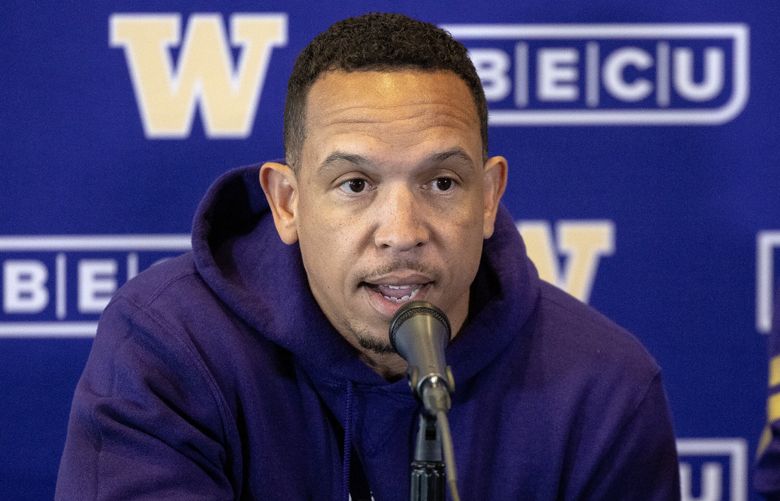
On Monday morning, Jedd Fisch sat at a table in the Touchdown Terrace suites beyond the east end zone at Husky Stadium. The 48-year-old Fisch, arms folded and scanning a page of notes, judged Ryan Walters to be “probably the best defensive coordinator in the country.”
Of course, there are credentials to back up this assertion. In 2022, Walters, who Fisch hired last month to replace Steve Belichick, led possibly college football’s best defensive. During his second season at Illinois, the Fighting Illini led the nation in scoring defense (12.8 points allowed per game), interceptions (24), opponent pass efficiency rating (92.64), opponent completion percentage (51.3%), and red-zone touchdown rate (35.5%). He evolved from a continuous punching bag to a Big Ten bully.Walters
Defensive coordinator Ryan Walters speaks about the upcoming season during a press conference Monday in Seattle. (Nick Wagner / The Seattle Times) ‘ career as Purdue’s coach was abruptly ended, as the Boilermakers finished 5-19 overall and 3-15 in Big Ten play. The 39-year-old coach was sacked on December 1 and hired by the Huskies less than a month later.
This brings us back to Monday, in the Touchdown Terrace suites, when Walters — dressed in a purple sweatshirt — decided to double down.
The Seattle Times columnist asks: “Ryan, when Jedd says you’re the best defensive coordinator in the country, what’s your reaction to that?”
Walters said without hesitation, “I agree.”
UW secondary coach John Richardson laughed beside him, possibly stunned by the refreshingly honest self-assessment.
“Because that’s what I’ve done,” Walters clarified his response. “The last time I was in charge of calling plays and running a defense at Illinois, we accomplished something extraordinary in two years. I also had a lot of success at Mizzou (where he spent six seasons on staff, the last three as defensive coordinator) in a difficult conference. I’ve never felt more determined or hungry to get back to it.”
Of course, the truth of that allegation does not need to be questioned. It will be proven, or disproven, inside Husky stadium.
But let us presume that February’s bluster translates into fall.
Will having the top defensive coordinator in college football significantly benefit UW?
Walters inherited a defense with verifiable
Strengths and weaknesses through 2024. Belichick developed a team that excelled against the pass, ranking first nationally in opponent yards per pass attempt (5.7), second in passing yards allowed per game (166.5), and 12th in opponent completion percentage (55.7%). The Huskies ranked 28th in total defense (328.4 yards allowed per game), a 71-spot improvement over 2023.
However, the improvement was not total. The Huskies were still struggling against the run, ranking 87th in rushing defense (161.85 yards allowed per game) and 88th in opponent yards per carry (4.56). They also struggled to disrupt offenses, ranking 98th in turnovers gained (14), 109th in sacks per game (1.54), and 132nd out of 134 teams in tackles for loss (3.69)
Damnably, UW struggled in important moments, ranking 92nd in red-zone touchdown rate (64.4%) and 107th in third-down defense (43.8% conversion).
It appears that Walters has seen such statistics.
“There are things that are musts on defense: Effort and physicality,” remarked the coach. “We’ll do excellent in the red zone. We’ll do excellent on third down. We’ll be excellent at taking the football away. We’ll be numerous.
“Coach Fisch mentioned that the system is schematically comparable to what UW was a year ago. So I believe in painting a different picture up front, attacking offenses — particularly on early downs — to create beneficial third-down scenarios.”
However, a plot, stunt, or veiled blitz can only do so much.
It is unknown whether Washington has the players.
dramatically and rapidly improve. After all, linebacker and leading tackler Carson Bruener, who has used up his eligibility, was the UW’s only All-Big Ten performer in 2024. The team’s top four tacklers (Bruener, Alphonzo Tuputala, Kamren Fabiculanan, and Sebastian Valdez) have all left the program, while outstanding cornerback Thaddeus Dixon (an All-Big-Ten honorable mention selection) has followed Belichick to North Carolina.
Simply said, UW’s defense may not be very good.
Does UW have the ability to make substantial progress? This will depend on the growth of returners such as cornerback Ephesians Prysock, edges Zach Durfee and Russell Davis II, defensive tackles Jayvon Parker
Elinneus Davis and safety Makell Esteen; the impact of transfers such as cornerback Tacario Davis, defensive tackles Simote Pepa and Anterio Thompson, linebackers Xe’ree Alexander and Taariq Al-Uqdah, and safeties CJ Christian and Alex McLaughlin; and the emergence of 29 true freshmen with something to prove right away.
Walters, for one, does not associate experience with potential effect.
“What I love about football: It is nondiscriminatory,” said Walters, who played safety at Colorado from 2004 to 2008. “It does not matter how old you are, what color your skin is, or your social status. The only thing that matters is what you record from snap to whistle. We’re a competitive program. So, if you’re in the top eleven, go play. My defensive track record.
His track record also provides reasons for optimism, considering Illinois sat 97th in scoring defense (34.9 points allowed per game) and 114th in total defense (466.8 yards allowed per game) the season before he was hired.
Considering UW’s limited returning production and lack of blue-chip thump, fans shouldn’t expect miracles on Montlake. It’ll still be hard to stop reigning national champion Ohio State inside Husky Stadium on Sept. 27, or rival Oregon on Nov. 29.
But when Walters leaned into a microphone and said, “I agree,” he simultaneously accepted an expectation.
If Walters really is the best defensive coordinator in the country, we should see it soon enough.
,
.
Leave a Reply